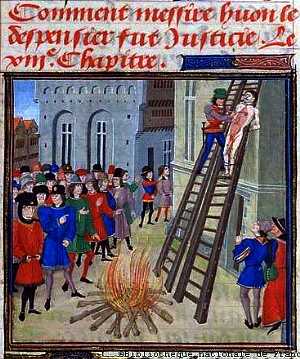
The execution of Hugh Despenser
She despised her husband, hated the Despensers and gave her favours in love and ennoblement to Mortimer. Although Edward III was king in name, effectively Mortimer and Isabella ran the country and, as part of his control, the Mortimers took the Manor of Martley.
Hugh le Despenser (1262 – October 17, 1326), son of Hugh le Despenser II, sometimes referred to as "the elder Despenser", was for a time the chief adviser to King Edward II of England.He was created a baron by writ of summons to Parliament in 1295. He was one of the few barons to remain loyal to Edward during the controversy regarding Piers Gaveston. Despenser became Edward's loyal servant and chief administrator after Gaveston was executed in 1312, but the jealousy of other barons led to his being exiled along with his son Hugh the younger Despenser in 1321, when Edmund de Woodstoke replaced him as Lord Warden of the Cinque Ports.
Edward found it difficult to manage without them, and recalled them to England a year later, an action which enraged the queen, Isabella, the more so when Despenser was created Earl of Winchester. When Isabella and her lover, Roger Mortimer, led a rebellion against the king, both Despensers were captured and executed. The elder Despenser was hanged at Bristol on October 27, 1326.
Hugh (1286 – November 26, 1326) was sometimes referred to as "the younger Despenser". He was the son and heir of Hugh le Despenser, Earl of Winchester, by Isabel Beauchamp, daughter of William de Beauchamp, 9th Earl of Warwick.
He was knight of Hanley Castle, Worcestershire, King's Chamberlain, Constable of Odiham Castle, Keeper of the castle and town of Dryslwyn, and Cantref Mawr, Carmarthenshire, Keeper of the castle and town of Portchester, Keeper of the castle, town and barton of Bristol. He was also Keeper of the castles, manor, and lands of Brecknock, Hay, cantref Selyf, etc., co. Brecon, and Huntington, Herefordshire. He was given Wallingford Castle although this had previously been given to Queen Isabella for life.
In May 1306 Hugh was knighted, and that summer he married Eleanor de Clare, a granddaughter of King Edward I of England. Her grandfather owed Hugh's father vast sums of money, and the marriage was intended as a payment of these debts. When Eleanor's brother was killed at the Battle of Bannockburn, she unexpectedly became one of the three co-heiresses to the rich Gloucester earldom, and in her right Hugh inherited Glamorgan and other properties. In just a few short years Hugh went from a landless knight to one of the wealthiest magnates in the kingdom.
Eleanor was also the niece of the new king, Edward II of England, and this connection brought Hugh closer to the English royal court. He joined the baronial opposition to Piers Gaveston, the king's favorite, and Hugh's brother-in-law, as Gaveston was married to Eleanor's sister. Eager for power and wealth, Hugh seized Tonbridge Castle in 1315. The next year he murdered Llywelyn Bren, a Welsh hostage in his custody.
Hugh Despenser became royal chamberlain in 1318. As a royal courtier, Hugh manoeuvred into the affections of King Edward, displacing the previous favorite, Roger d'Amory. By 1320 his tyranny was running free. Hugh seized the Welsh lands of his wife's inheritance, ignoring the claims of his two brothers-in-law. He forced Alice de Lacy, Countess of Lincoln, to give up her lands, cheated his sister-in-law Elizabeth de Clare out of Gower and Usk, and allegedly had Lady Baret's arms and legs broken until she went insane. He also supposedly vowed to be revenged on Roger Mortimer because Mortimer's grandfather had murdered Hugh's grandfather, and once stated (though probably in jest) that he regretted he could not control the wind. By 1321 he had earned many enemies in every strata of society, from Queen Isabella to the barons to the common people. There was even a bizarre plot to kill Hugh by sticking pins in a wax likeness of him.
Finally the barons prevailed upon King Edward and forced Hugh and his father into exile in 1321. His father fled to Bordeaux, and Hugh became a pirate in the English channel, "a sea monster, lying in wait for merchants as they crossed his path". The pair returned the next year and King Edward quickly reinstated Hugh as royal favorite. His time in exile had done nothing to quell his greed, his rashness, or his ruthlessness.
|
While Queen Isabella was in France to negotiate between her husband and the French king, she formed a liaison with Roger Mortimer and began planning an invasion. Hugh supposedly tried to bribe French courtiers to assassinate Queen Isabella. When Mortimer and the queen invaded England in October 1326, King Edward was deposed, Hugh's father was executed, and Hugh himself was captured.
Hugh tried to starve himself before his trial, but face trial he did on November 24 1326, in Hereford. He was judged a traitor and a thief, and sentenced to public execution. Immediately, he was dragged behind four horses to his place of execution, where a great fire was lit. He was hanged from a gallows fifty feet high, but cut down before he could choke to death and tied to a ladder, in full view of the crowd. A man climbed up beside him, and sliced off his penis and testicles which were then burnt before him, still alive and conscious. Subsequently, the executioner plunged his knife into his abdomen, and cut out his entrails and heart, which were likewise burnt before the delighted crowd. Finally, he was beheaded, and his body cut into four pieces, and his head was mounted on the gates of London.